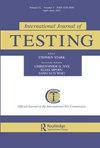Item Parameter Drift in Context Questionnaires from International Large-Scale Assessments
IF 1.4
Q2 SOCIAL SCIENCES, INTERDISCIPLINARY
引用次数: 2
Abstract
The purpose of the current study was to examine the impact of item parameter drift (IPD) occurring in context questionnaires from an international large-scale assessment and determine the most appropriate way to address IPD. Focusing on the context of psychometric and educational research where scores from context questionnaires composed of polytomous items were employed for the classification of examinees, the current research investigated the impacts of IPD on the estimation of questionnaire scores and classification accuracy with five manipulated factors: the length of a questionnaire, the proportion of items exhibiting IPD, the direction and magnitude of IPD, and three decisions about IPD. The results indicated that the impact of IPD occurring in a short context questionnaire on the accuracy of score estimation and classification of examinees was substantial. The accuracy in classification considerably decreased especially at the lowest and highest categories of a trait. Unlike the recommendation from literature in educational testing, the current study demonstrated that keeping items exhibiting IPD and removing them only for transformation were appropriate when IPD occurred in relatively short context questionnaires. Using 2011 TIMSS data from Iran, an applied example demonstrated the application of provided guidance in making appropriate decisions about IPD.国际大型评估问卷中项目参数的漂移
本研究的目的是检验国际大规模评估的情境问卷中项目参数漂移(IPD)的影响,并确定解决IPD的最合适方法。本研究以心理测量和教育研究为背景,采用由多个相似项目组成的情境问卷中的分数对考生进行分类,通过五个操纵因素调查了IPD对问卷分数估计和分类准确性的影响:问卷长度、,显示IPD的项目的比例、IPD的方向和大小,以及关于IPD的三个决策。结果表明,在简短的上下文问卷中出现的IPD对考生的分数估计和分类的准确性有很大的影响。分类的准确性显著下降,尤其是在一个性状的最低和最高类别。与教育测试中文献中的建议不同,当前的研究表明,当IPD发生在相对较短的情境问卷中时,保留显示IPD的项目并仅为转换而删除它们是合适的。利用2011年伊朗TIMSS数据,一个应用实例展示了所提供的指导在IPD相关决策中的应用。
本文章由计算机程序翻译,如有差异,请以英文原文为准。
求助全文
约1分钟内获得全文
求助全文
来源期刊

International Journal of Testing
SOCIAL SCIENCES, INTERDISCIPLINARY-
CiteScore
3.60
自引率
11.80%
发文量
13
 求助内容:
求助内容: 应助结果提醒方式:
应助结果提醒方式:


